| Listing 1 - 10 of 13 | << page >> |
Sort by
|
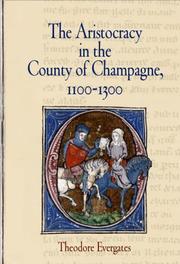
ISBN: 9780812240191 0812240197 1322510792 0812201884 Year: 2007 Publisher: Philadelphia : University of Pennsylvania Press,
Abstract | Keywords | Export | Availability | Bookmark
 Loading...
Loading...Choose an application
- Reference Manager
- EndNote
- RefWorks (Direct export to RefWorks)
Theodore Evergates provides the first systematic analysis of the aristocracy in the county of Champagne under the independent counts. He argues that three factors-the rise of the comital state, fiefholding, and the conjugal family-were critical to shaping a loose assortment of baronial and knightly families into an aristocracy with shared customs, institutions, and identity. Evergates mines the rich, varied, and in some respects unique collection of source materials from Champagne to provide a dynamic picture of a medieval aristocracy and its evolving symbiotic relationship with the counts.Count Henry the Liberal (1152-81) began the process of transforming a quasi-independent baronage accustomed to collegial governance into an elite of landholding families subordinate to the count and his officials. By the time Countess Jeanne married the future King Philip IV of France in 1284, the fiefholding families of Champagne had become a distinct provincial nobility. Throughout, it was the conjugal community, rather than primogeniture or patrilineage, that remained the core familial institution determining the customs regarding community property, dowry, dower, and partible inheritance. Those customs guaranteed that every lineage would survive, but frequently through a younger son or daughter. The life courses of women and men, influenced not only by social norms but also by individual choice and circumstance, were equally unpredictable. Evergates concludes that imposed models of "the aristocratic family" fail to capture the diversity of individual lives and lineages within one of the more vibrant principalities of medieval France.
Aristocracy (Social class) --- Nobility --- Aristocratie --- Noblesse --- History --- Histoire --- Champagne-Ardenne (France) --- History. --- Social life and customs. --- Moeurs et coutumes --- Noble class --- Noble families --- Nobles (Social class) --- Peerage --- Upper class --- Titles of honor and nobility --- Aristocracy --- Aristocrats --- Champagne-Ardenne, France --- Champagne (France : Province) --- Grand Est (France) --- Aristocracy (Social class) - France - Champagne-Ardenne - History --- Nobility - France - Champagne-Ardenne - History --- Medieval and Renaissance Studies. --- Champagne, Comtes de --- France --- 1100-1300 --- Champagne (France)
Book
ISBN: 9780300114553 0978300114553 0300114559 Year: 2010 Publisher: New Haven: Yale university press,
Abstract | Keywords | Export | Availability | Bookmark
 Loading...
Loading...Choose an application
- Reference Manager
- EndNote
- RefWorks (Direct export to RefWorks)
Aristocracy (Social class) --- Nobility --- Aristocratie --- Noblesse --- History --- Histoire --- Great Britain --- Grande-Bretagne --- Social conditions. --- Conditions sociales --- Social conditions --- 929.7 <420> --- Adel. Eretitels--Engeland --- 942 --- Aristocracy --- Aristocrats --- Upper class --- 942 Geschiedenis van Engeland en Groot-Brittannië --- Geschiedenis van Engeland en Groot-Brittannië --- Power (Social sciences) --- Pouvoir (sciences sociales) --- England --- Aristocracy (Social class) - Great Britain - History - To 1500 --- Nobility - Great Britain - History - To 1500 --- Great Britain - History - 1066-1687 --- Great Britain - Social conditions
Book
ISSN: 12552364 ISBN: 9782753552593 2753552592 2753585016 Year: 2017 Publisher: Rennes : Presses Universitaires de Rennes,
Abstract | Keywords | Export | Availability | Bookmark
 Loading...
Loading...Choose an application
- Reference Manager
- EndNote
- RefWorks (Direct export to RefWorks)
"Noblesse oblige". La maxime du duc Pierre-Marc-Gaston de Lévis (1764-1830) est passée dans le langage courant pour évoquer les obligations morales qui pèsent sur les détenteurs d'un nom, et plus généralement pour inviter tous les prétendants à la respectabilité à adopter un comportement conforme à la dignité qu'ils revendiquent. L'idée n'était pas nouvelle. En 1665, dans son "Dom Juan", Molière plaçait déjà dans la bouche de Dom Louis une tirade véhémente devenue fameuse : "Non, non, la naissance n'est rien où la vertu n'est pas". Si la noblesse reposait sur la vertu, quelle définition donnait-on à cette qualité ? S'agissait-il du courage guerrier, de l'exemplarité morale ou de l'appartenance au monde des gens de bien ? Vivre de ses rentes ne suffisait plus pour être reconnu comme noble dans une société où, à partir du XVIIe siècle, le roi s'imposa comme le maître des identités. Sous une unité de façade, quelles failles économiques, culturelles et idéologiques traversaient la noblesse à l'époque moderne ? À quelles obligations, surtout, se sentait-elle tenue, et quelles formes prenaient les engagements politiques, religieux et partisans qui l'animaient ? Quel était le sens des termes "vocation" ou "service" pour les seigneurs et les dames de l'Ancien Régime ? C'est à ces questions, et à quelques autres, que ce volume propose des éléments de réponse, non par une approche systématique de la noblesse en tant qu'ordre ou catégorie sociale illusoire, mais à travers unes analyse fondée sur l'examen de traces, de textes et d'archives, qui permettent de brosser un panorama de la société des princes et des princesses, des seigneurs et des capitaines, des nobles d'épée et des courtisans, entre le temps de la Renaissance et l'aube du XIXe siècle.
Nobility --- Aristocracy (Social class) --- Group identity --- Group values (Sociology) --- Social values --- Collective identity --- Community identity --- Cultural identity --- Social identity --- Identity (Psychology) --- Social psychology --- Collective memory --- Aristocracy --- Aristocrats --- Upper class --- Noble class --- Noble families --- Nobles (Social class) --- Peerage --- Titles of honor and nobility --- History. --- Political activity --- Noblesse --- Identité collective --- History of civilization --- anno 1500-1799 --- --Europe --- --XVIe-XVIIIe s., --- History --- Political activity&delete& --- XVIe-XVIIIe s., 1501-1800 --- Europe --- Identité collective --- noblesse --- société --- histoire moderne
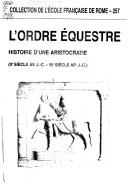
ISBN: 2728304459 9782728304455 Year: 1999 Volume: 257 Publisher: Rome: École française de Rome,
Abstract | Keywords | Export | Availability | Bookmark
 Loading...
Loading...Choose an application
- Reference Manager
- EndNote
- RefWorks (Direct export to RefWorks)
Roman history --- Aristocracy (Social class) --- Equestrian order (Rome) --- Aristocratie (Classe sociale) --- Ordre équestre (Rome) --- Congresses --- Congrès --- Rome --- Social conditions --- Conditions sociales --- -Equestrian order (Rome) --- 305.52 --- 937.02 --- Equites (Rome) --- Knights, Roman --- Aristocracy --- Aristocrats --- Upper class --- Nobility --- Social sciences Social classes Upper class --- History Ancient world Italy 500 - 31 B.C. --- Social conditions. --- Ordre équestre (Rome) --- Congrès --- History Ancient world Italy 500 - 31 B.C --- Rim --- Roman Empire --- Roman Republic (510-30 B.C.) --- Romi (Empire) --- Byzantine Empire --- Rome (Italy) --- Geschiedenis van het Romeinse Rijk --- Aristocracy (Social class) - Rome - Congresses. --- Equestrian order (Rome) - Congresses.
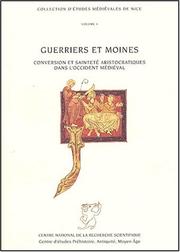
ISBN: 2904110356 9782904110351 Year: 2002 Volume: 4 Publisher: antibes : APDCA,
Abstract | Keywords | Export | Availability | Bookmark
 Loading...
Loading...Choose an application
- Reference Manager
- EndNote
- RefWorks (Direct export to RefWorks)
Christian church history --- History of civilization --- anno 1100-1199 --- anno 900-999 --- anno 800-899 --- anno 1000-1099 --- Monasticism and religious orders --- Military religious orders --- Christian saints --- Conversion --- Aristocracy (Social class) --- Christian hagiography --- Monachisme et ordres religieux --- Ordres militaires religieux --- Saints chrétiens --- Aristocratie (Classe sociale) --- Hagiographie chrétienne --- History --- Christianity --- Histoire --- Christianisme --- Europe --- Church history --- Histoire religieuse --- Christian life --- Saints --- Catholic Church --- Saints chrétiens --- Hagiographie chrétienne --- Persons --- Religious conversion --- Psychology, Religious --- Proselytizing --- Christians --- Discipleship --- Religious life --- Theology, Practical --- Aristocracy --- Aristocrats --- Upper class --- Nobility --- Christian life - History - Middle Ages, 600-1500 - Congresses --- Conversion - Catholic Church - Congresses --- Saints - Congresses --- Aristocracy (Social class) - Europe - Congresses
Book
ISBN: 9781843834854 1843834855 9781846157554 9786612987861 1846157552 1282987860 Year: 2009 Publisher: Suffolk Boydell & Brewer
Abstract | Keywords | Export | Availability | Bookmark
 Loading...
Loading...Choose an application
- Reference Manager
- EndNote
- RefWorks (Direct export to RefWorks)
The official records of England are the focus of this volume - their origin, their use, and what they reveal. The major theme of this volume is the records of the Anglo-Norman realm, and how they are used separately and in combination to construct the history of England and Normandy. The essays cover all types of written source material, including private charters and the official records of the chancery and Exchequer, chronicles, and personal sources such as letters, while some 100 previously unpublished documents are included in a series of appendices. There are studies here of particular Anglo-Normans, including a great aristocrat and a seneschal of Normandy; of records relating to Normandy surviving in England; of the Norman and English Exchequers, between them the financial mainstay of the king/dukes; of the controversial origins of the English Chancery records; and of Rosamund Clifford, the King's mistress. CONTRIBUTORS: NICHOLAS VINCENT, DAVID CARPENTER, DAVID CROOK, MARK HAGGER, DAVID CROUCH, MARIE LOVATT, DANIEL POWER.
Public records --- Normans --- Aristocracy (Social class) --- History --- Great Britain --- Normandy (France) --- Northmen --- Aristocracy --- Aristocrats --- Upper class --- Nobility --- Government records --- Public administration --- Records --- Archives --- Government information --- Normandie (France) --- Basse-Normandie (France) --- Haute-Normandie (France) --- Public records - England - History - To 1500 - Sources - Congresses --- Normans - England - History - Sources - Congresses --- Aristocracy (Social class) - England - History - To 1500 - Sources - Congresses --- Great Britain - History - John, 1199-1216 - Sources - Congresses --- Great Britain - History - Angevin period, 1154-1216 - Sources - Congresses --- Great Britain - History - Norman period, 1066-1154 - Sources - Congresses --- Normandy (France) - History - To 1515 - Sources - Congresses --- Anglo-Norman Realm. --- Aristocratic Society. --- King John. --- Normandy. --- Records. --- Sources
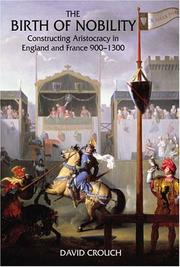
ISBN: 0582369819 9780582369818 Year: 2005 Publisher: Harlow: Pearson Longman,
Abstract | Keywords | Export | Availability | Bookmark
 Loading...
Loading...Choose an application
- Reference Manager
- EndNote
- RefWorks (Direct export to RefWorks)
Nobility --- Aristocracy (Social class) --- Social history --- History --- Great Britain --- France --- Social life and customs --- 316.343.32 --- 929.7 --- Adel --(sociale stratificatie) --- Adel. Eretitels --- 929.7 Adel. Eretitels --- 316.343.32 Adel --(sociale stratificatie) --- Noble class --- Noble families --- Nobles (Social class) --- Peerage --- Upper class --- Titles of honor and nobility --- Aristocracy --- Aristocrats --- Nobility - Great Britain - History - To 1500 --- Nobility - France - History - To 1500 --- Aristocracy (Social class) - Great Britain - History - To 1500 --- Aristocracy (Social class) - France - History - To 1500 --- Social history - Medieval, 500-1500 --- Acqui 2006 --- Great Britain - Social life and customs - 1066-1485 --- France - Social life and customs - To 1328
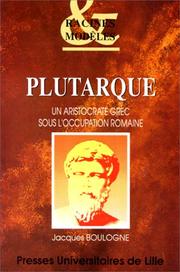
ISBN: 2859394737 9782859394738 Year: 1994 Volume: *3 Publisher: Lille: Presses universitaires de Lille,
Abstract | Keywords | Export | Availability | Bookmark
 Loading...
Loading...Choose an application
- Reference Manager
- EndNote
- RefWorks (Direct export to RefWorks)
Aristocracy (Social class) --- Philosophers --- Biographers --- Civilization, Greco-Roman. --- Biography. --- -Biographers --- -Civilization, Greco-Roman --- -Scholars --- Greco-Roman civilization --- Civilization, Classical --- Authors --- Aristocracy --- Aristocrats --- Upper class --- Nobility --- Biography --- Plutarch --- -Plutarchus --- Plutarkh --- Plutarkhus --- Plutarque --- Plutarco --- Plutarchus, --- Plutarch, --- Ploutarchos --- Blūtārkhūs --- Плутарх --- Плутах --- Plutarh --- פלוטארכוס --- پلوتارخ --- Πλούταρχος, --- Pseudo-Plutarch --- Plutarkhosz --- Knowledge --- -Rome --- Greece --- History --- -Biography. --- Rome. --- -Biography --- -Knowledge --- Civilization, Greco-Roman --- Plutarchus --- Griechenland --- Grèce --- Hellas --- Yaṿan --- Vasileion tēs Hellados --- Hellēnikē Dēmokratia --- République hellénique --- Royaume de Grèce --- Kingdom of Greece --- Hellenic Republic --- Ancient Greece --- Ελλάδα --- Ellada --- Ελλάς --- Ellas --- Ελληνική Δημοκρατία --- Ellēnikē Dēmokratia --- Elliniki Dimokratia --- Grecia --- Grčija --- Hellada --- اليونان --- يونان --- al-Yūnān --- Yūnān --- 希腊 --- Xila --- Греция --- Gret︠s︡ii︠a︡ --- Ploetarchos --- Plutarchus Chaeronensis --- Contemporary Rome --- Views on Rome --- Aristocracy (Social class) - Greece - Biography. --- Philosophers - Greece - Biography. --- Biographers - Greece - Biography.
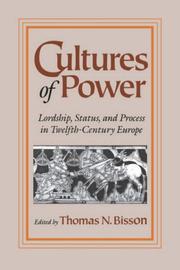
ISBN: 0812232909 0812215559 1322510342 0812200764 0585126496 9780812232905 Year: 1995 Publisher: Philadelphia : ©1995 University of Pennsylvania Press,
Abstract | Keywords | Export | Availability | Bookmark
 Loading...
Loading...Choose an application
- Reference Manager
- EndNote
- RefWorks (Direct export to RefWorks)
The authors of Cultures of Power proffer diverse perspectives on the prehistory of government in Northern France, Spain, Germany, the Low Countries, and England. Political, social, ecclesiastical, and cultural history are brought to bear on topics such as aristocracies, women, rituals, commemoration, and manifestations of power through literary, legal, and scriptural means.
Twelfth century --- Nobility --- Elite (Social sciences) --- Social history --- Power (Social sciences) --- Douzième siècle --- Noblesse --- Elite (Sciences sociales) --- Histoire sociale --- Pouvoir (Sciences sociales) --- Congresses --- History --- Congresses. --- Congrès --- Histoire --- Europe --- Social conditions --- Politics and government --- Conditions sociales --- Politique et gouvernement --- Aristocracy (Social class) --- Upper class --- -Elite (Social sciences) --- -Nobility --- -Power (Social sciences) --- -Social history --- -Upper class --- -Fashionable society --- High society --- Society, High --- Upper classes --- Social classes --- Descriptive sociology --- Sociology --- Noble class --- Noble families --- Nobles (Social class) --- Peerage --- Titles of honor and nobility --- Elites (Social sciences) --- Leadership --- Social groups --- Aristocracy --- Aristocrats --- -Congresses --- -History --- Douzième siècle --- Congrès --- Fashionable society --- History&delete& --- Nobility - Europe - History - Congresses. --- Aristocracy (Social class) - Europe - History - Congresses. --- Elite (Social sciences) - Europe - History - Congresses. --- Social history - Medieval, 500-1500 - Congresses --- Upper class - Europe - History - Congresses. --- Power (Social sciences) - Congresses
Book
ISBN: 1108422675 9781108422673 9781108525190 9781108436854 1108436854 1108525199 1108534198 1108529933 Year: 2019 Publisher: Cambridge Cambridge University Press
Abstract | Keywords | Export | Availability | Bookmark
 Loading...
Loading...Choose an application
- Reference Manager
- EndNote
- RefWorks (Direct export to RefWorks)
This book presents a radical new interpretation of Roman expansion in Italy during the fourth and third centuries BCE. Nicola Terrenato argues that the process was accomplished by means of a grand bargain that was negotiated between the landed elites of central and southern Italy, while military conquest played a much smaller role than is usually envisaged. Deploying archaeological, epigraphic, and historical evidence, he paints a picture of the family interactions that tied together both Roman and non-Roman aristocrats and that resulted in their pooling power and resources for the creation of a new political entity. The book is written in accessible language, without technical terms or quotations in Latin, and is heavily illustrated
Antiquities. --- Historiography --- Historiography. --- Politics and government. --- To 476. --- Italy --- Italy. --- Rome (Empire). --- Rome --- History --- History, Military --- Military antiquities. --- Politics and government --- Rome ancienne --- --Historiographie --- --Histoire --- --Politique et gouvernement --- --VIe s. av JC-Ier s., --- Histoire militaire --- --Italie ancienne --- --Rome --- Military antiquities --- To 476 --- Rome (Empire) --- Foreign relations --- Historiography - Rome --- Rome - History - Republic, 510-265 B.C --- Rome - History, Military - 265-30 B.C --- Rome - Military antiquities --- Rome - Politics and government - 510-30 B.C --- Italy - History - To 476 --- Historiographie --- Histoire --- Politique et gouvernement --- VIe s. av JC-Ier s., 600 av JC-100 --- Italie ancienne --- Rome - History - Republic, 510-265 B.C. --- Rome - History, Military - 265-30 B.C. --- Rome - Politics and government - 510-30 B.C. --- Aristocracy (Social class) --- Elite (Social sciences) --- History. --- Elites (Social sciences) --- Leadership --- Power (Social sciences) --- Social classes --- Social groups --- Aristocracy --- Aristocrats --- Upper class --- Nobility
| Listing 1 - 10 of 13 | << page >> |
Sort by
|

 Search
Search Feedback
Feedback About UniCat
About UniCat  Help
Help News
News